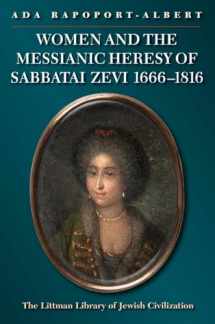
Women and the Messianic Heresy of Sabbatai Zevi, 1666 - 1816 (The Littman Library of Jewish Civilization)
Book details
Summary
Description
Women are conspicuously absent from the Jewish mystical tradition. Even if, historically, some Jewish women may have experienced mystical revelations and led richly productive spiritual lives, the tradition does not preserve any record of their experiences or insights. Only the chance survival of scant evidence suggests that, at various times and places, individual Jewish women did pursue the path of mystical piety or prophetic spirituality, but it appears that they were generally censured, and efforts were made to suppress their activities. This contrasts sharply with the fully acknowledged prominence of women in the mystical traditions of both Christianity and Islam. It is against this background that the mystical messianic movement centered on the personality of Sabbatai Zevi (1626-1676) stands out as a unique and remarkable exception. Sabbatai's highly original liberationist message proclaimed that he had come to make women 'as happy as men' by releasing them from the pangs of childbirth and subjugation to their husbands ordained for them as a consequence of the primordial sin. This unprecedented redemptive vision became an integral part of Sabbatian eschatology, which the messianists believed to be unfolding and experienced in the present. Their New Law, superseding the Old with the dawning of the messianic era, overturned the traditional halakhic norms that distinguished and regulated relations between the sexes. This was expressed not only in the outlandish ritual transgression of sexual prohibitions, in which Sabbatian women were notoriously implicated, but also in the apparent adoption of the idea - alien to rabbinic Judaism - that virginity, celibacy, or sexual abstinence were conducive to women's spiritual empowerment. Now available in paperback, this book traces the diverse manifestations of this vision in every phase of Sabbatianism and its offshoots. These include the early promotion of women to center stage as messianic prophetesses; their independent affiliation with the movement in their own right; their initiation into the esoteric teachings of the kabbalah; and their full incorporation, on a par with men, into the ritual and devotional life of the messianic community. *** "To be congratulated for demonstrating that Jewish messianic mysticism, far from being an arcane scholarly domain of interest only to textual specialists, is a topic of key significance to anyone interested in the processes through which the corporatist boundaries of eighteenth-century European society travelled." -- Adam Sutcliffe, Eighteenth-Century Studies *** "Not only breaks down many stereotypes about the roles of women in Judaism and Jewish society, but it is also a major contribution to understanding how Sabbatianism and Frankism spread and operated...rich in original ideas and insights." -- Shaul Stampfer, Religious Studies Review *** "Exhaustively researched and brilliantly written." -- David Biale, Jewish Review of Books [Subject: Jewish Studies, Religious Studies, History, Women's Studies]


We would LOVE it if you could help us and other readers by reviewing the book
Book review



